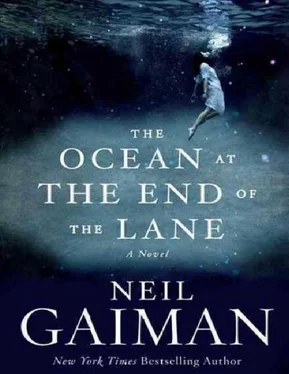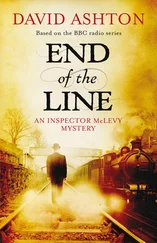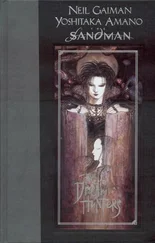I let go, dropped to the puddled bathroom lino. I took a step backward, toward the toilet. He looked down at me. Then he said, “Go to your bedroom I don’t want to see you again tonight.”
I went to my room.
Iwas shivering convulsively and I was wet through and I was cold, very cold. It felt like all my heat had been stolen. The wet clothes clung to my flesh and dripped cold water onto the floor. With every step I took my sandals made comical squelching noises, and water oozed from the little diamondshaped holes on the top of the sandals.
I pulled all of my clothes off, and I left them in a sopping heap on the tiles by the fireplace, where they began to puddle. I took the box of matches from the mantelpiece, turned on the gas tap and lit the flame in the gas fire.
(I am staring at a pond, remembering things that are hard to believe. Why do I find the hardest thing for me to believe, looking back, is that a girl of five and a boy of seven had a gas fire in their bedroom?)
There were no towels in the room, and I stood there, wet, wondering how to dry myself off. I took the thin counterpane that covered my bed, wiped myself off with it, then put on my pajamas. They were red nylon, shiny and striped, with a black plasticized burn mark on the left sleeve, where I had leaned too close to the gas fire once, and the pajama arm caught alight, although by some miracle I had not burned my arm.
There was a dressing gown that I almost never used hanging on the back of the bedroom door, its shadow perfectly positioned to cast nightmare shadows on the wall when the hall light was on and the door was open. I put it on.
The bedroom door opened, and my sister came in to get the nightdress from under her pillow. She said, “You’ve been so naughty that I’m not even allowed to be in the room with you. I get to sleep in Mummy and Daddy’s bed tonight. And Daddy says I can watch the television .”
There was an old television in a brown wooden cabinet in the corner of my parents’ bedroom that was almost never turned on. The vertical hold was unreliable, and the fuzzy black-and-white picture had a tendency to stream, in a slow ribbon: people’s heads vanished off the bottom of the screen as their feet descended, in a stately fashion, from the top.
“I don’t care,” I told her.
“Daddy said you ruined his tie. And he’s all wet,” said my sister, with satisfaction in her voice.
Ursula Monkton was at the bedroom door. “We don’t talk to him,” she told my sister. “We won’t talk to him again until he’s allowed to rejoin the family.”
My sister slipped out, heading to the next room, my parents’ room “You aren’t in my family,” I
told Ursula Monkton. “When Mummy comes back, I’ll tell her what Daddy did.”
“She won’t be home for another two hours,” said Ursula Monkton. “And what can you say to hei that will do anything? She backs up your father in everything, doesn’t she?”
She did. They always presented a perfectly united front.
“Don’t cross me,” said Ursula Monkton. “I have things to do here, and you are getting in my way. Next time it will be so much worse. Next time, I lock you in the attic.”
“I’m not afraid of you,” I told her. I was afraid of her, more afraid than I had ever been of
anything.
“It’s hot in here,” she told me, and smiled. She walked over to the gas fire, reached down, turned it off, took the matches from the mantel.
I said, “You’re still just a flea.”
She stopped smiling. She reached up to the lintel above the door, higher than any child could reach, and she pulled down the key that rested there. She walked out of the room, and closed the door. I heard the key turn, heard the lock engage and click.
I could hear television voices coming from the room next door. I heard the hallway door close, cutting off the two bedrooms from the rest of the house, and I knew that Ursula Monkton was going downstairs. I went over to the lock, and squinted through it. I had learned from a book that I could use a pencil to push a key through a keyhole onto a sheet of paper beneath, and free myself that way . . . but the keyhole was empty.
I cried then, cold and still damp, in that bedroom, cried with pain and anger and terror, cried safely in the knowledge that no one would come in and see me, that no one would tease me for crying, as they teased any boys at my school who were unwise enough to give way to tears.
I heard the gentle patter of raindrops against the glass of my bedroom window, and even that brought me no joy.
I cried until I was all cried out. Then I breathed in huge gulps of air, and I thought, Ursula Monkton, flapping canvas monster, worm and flea, would get me if I tried to leave the property. I knew that.
But Ursula Monkton had locked me in. She would not expect me to leave now.
And, perhaps, if I was lucky, she might be distracted.
I opened the bedroom window, and listened to the night. The gentle rain made a noise that was almost a rustling. It was a cold night, and I was already chilled. My sister was in the room next door, watching something on the television. She would not hear me.
I went over to the door, and turned off the light.
I walked through the dark bedroom, and climbed back on the bed.
I’m in my bed, I thought. I’m lying in my bed, thinking about how upset I am. Soon, I’ll fall asleep. I’m in my bed, and I know she’s won, and if she checks up on me I’m in my bed, asleep.
I’m in my bed and it’s time for me to sleep now . . . I can’t even keep my eyes open. I’m fast asleep. Fast asleep in my bed. . .
I stood on the bed, and climbed out of the window. I hung for a moment, then let myself drop, as quietly as I could, onto the balcony. That was the easy bit.
Growing up, I took so many cues from books. They taught me most of what I knew about what people did, about how to behave. They were my teachers and my advisors. In books, boys climbed trees, so I climbed trees, sometimes very high, always scared of falling. In books, people climbed up and down drainpipes to get in and out of houses, so I climbed up and down drainpipes too. They were the heavy iron drainpipes of old, clamped to the brick, not today’s lightweight plastic affairs.
I had never climbed down a drainpipe in the dark, or in the rain, but I knew where the footholds were. I knew also that the biggest challenge would not be falling, a twenty-foot tumble down into the wet flower bed; it was that the drainpipe I was climbing down went past the television room, downstairs, in which, I had no doubt, Ursula Monkton and my father would be watching television.
I tried not to think.
I climbed over the brick wall that edged the balcony, reached out until I felt the iron drainpipe, cold and slick with rain. I held on to it, then took one large step toward it, letting my bare feet come to rest on the metal clamp that encircled the drainpipe, fixing it sturdily to the brick.
I went down, a step at a time, imagining myself Batman, imagining myself a hundred heroes and heroines of school romances, then, remembering myself, I imagined that I was a drop of rain on the wall, a brick, a tree. I am on my bed, I thought. I was not here, with the light of the TV room uncurtained, spilling out below me, making the rain that fell past the window into a series of glittering lines and streaks.
Don’t look at me, I thought. Don’t look out of the window.
I inched down. Usually I would have stepped fromthe drainpipe over to the TV room’s outer window ledge, but that was out of the question. Warily, I lowered myself another few inches, leaned further back into the shadows and away from the light, and I stole a terrified glance into the room, expecting to see my father and Ursula Monkton staring back at me.
Читать дальше












